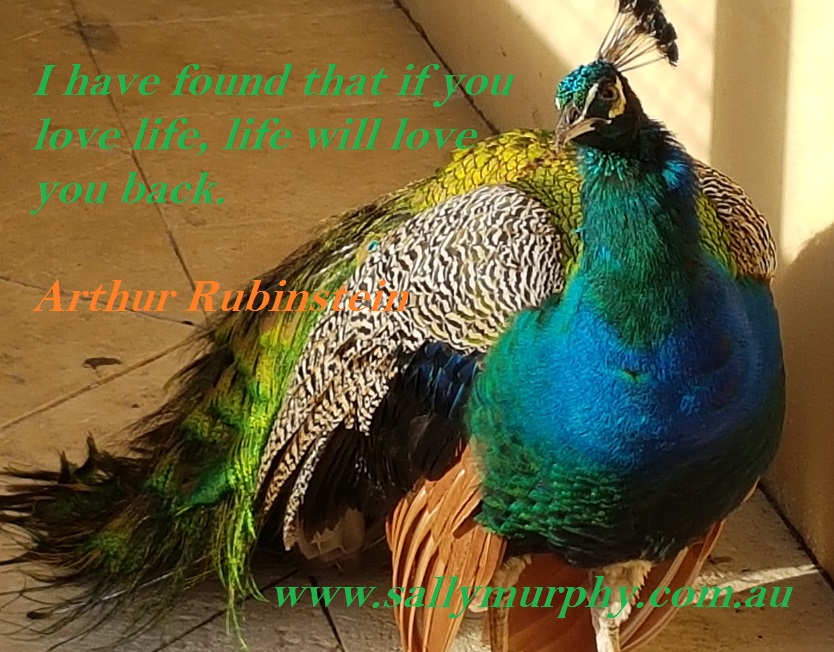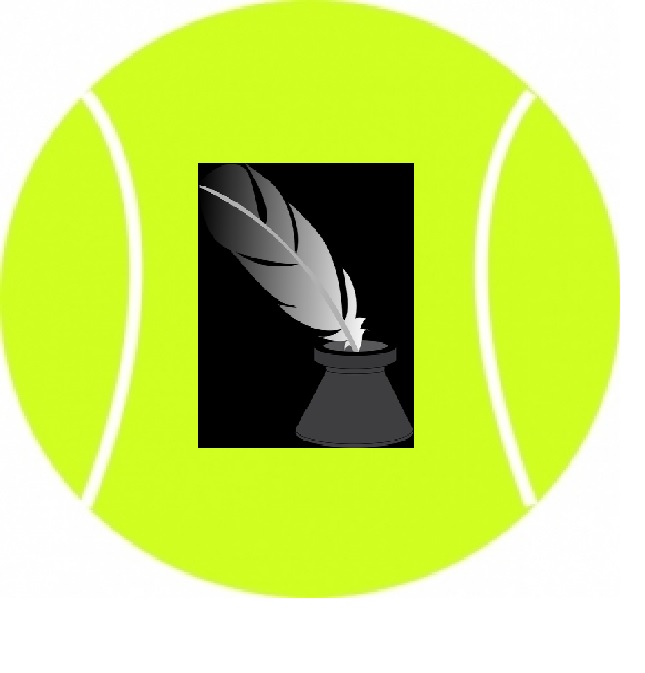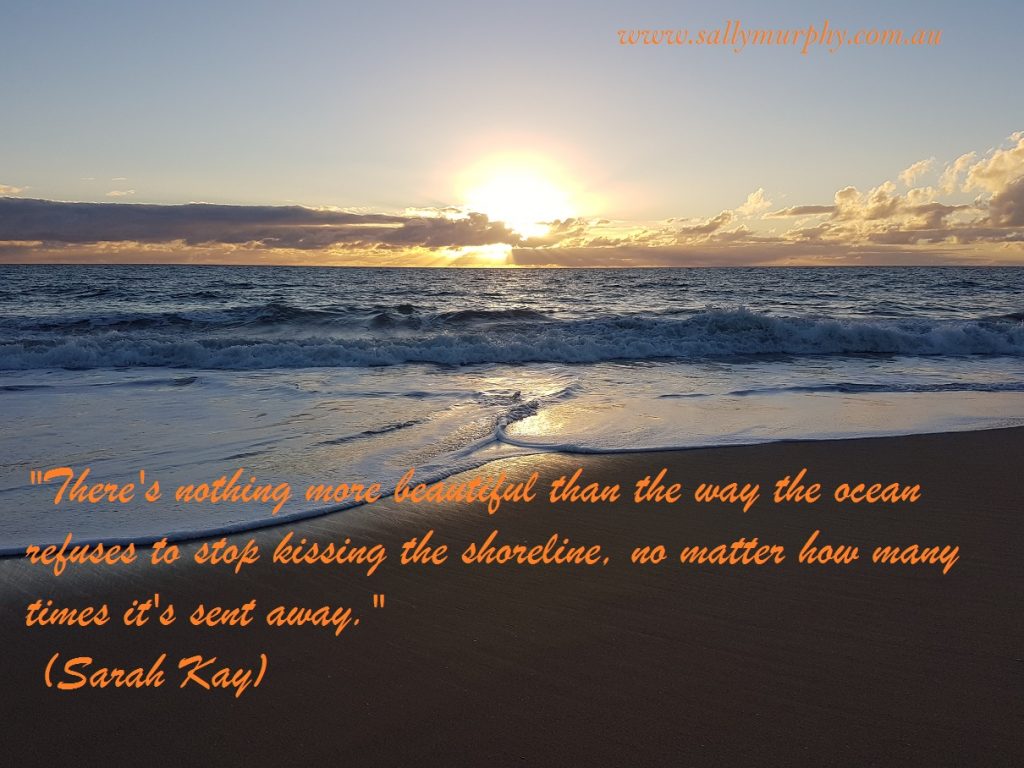
A Monday Quote

A Monday Quote

How Tennis is Just like Writing
 It’s tennis season. As I type this, I’m sitting, well rugged up against a cold winter night, with my feet up on the recliner, lap top on lap, watching the opening games of Wimbledon. It’s going to be a busy few weeks. <grin>
It’s tennis season. As I type this, I’m sitting, well rugged up against a cold winter night, with my feet up on the recliner, lap top on lap, watching the opening games of Wimbledon. It’s going to be a busy few weeks. <grin>
Okay, so maybe being an armchair sportswoman isn’t quite the same as being out on the court, but I do love watching tennis (among other sports). I love seeing finely tuned sports players battling it out. I love to see underdogs win, and true sportspeople win with grace. (I’m not such a fan of the exhibitions of bad sportsmanship, but fortunately those are overshadowed by the acts of courage, of strength and of resilience.)
The other thing I love about professional tennis is just how much it’s like professional writing. Consider this.
- You have to start with the basics. No one just wakes up one morning, says ‘I’m gonna win Wimbledon’, then grabs a racket and a plane ticket and flies off to London to play. No way. First (and usually from a pretty young age), you learn maybe how to hold a racket. How to hit the ball, how to actually get itover the net. Then how to serve, how to move round the court. Then maybe you play your first game. And, after lots of practice, maybe over years of junior tennis, you enter a tournament. Then another and another. Eventually, you might start to win a few. Then you enter bigger tournaments. You constantly improve, and learn more skills. And eventually, if you’re good enough, you might just find yourself invited to play at Wimbledon. And, if you can survive the two weeks of matches without losing any, you just might be the winner. That big cup that hold up in front of all those people is the culmination of years and years and years of hard work.
It’s the same with writing. The journey to being a published author begins in childhood. You might not even know yet that you want to be an author, but you pick a pencil and you start to learn to write. You learn to read. You learn spelling, and sentence formation and punctuation. You start to create stories, sometimes because a teacher sets you a task, but hopefully also because you enjoy it. At some point in your life you might decide that you’d like to see your name on the cover of a book that you wrote. You want the world to see your stories. So you write, and rewrite. You learn your craft. You fine tune it. You revise your writing. You learnt he industry. You submit t publishers. And, with perseverance, and an occasional stroke of luck, there comes a day when a publisher says yes, and you get to hold that book up to the world to see. The culmination of years and years of hard work.
- You don’t only pick up a racquet and ball on match day. Even once they’ve made it to the professional circuit, tennis players must practice. They train. They try to improve their strokes, their serves, their match strategies. They work with coaches. They hit up with other tennis players. They run, or work out in the gym. None of this happens in front of huge crowds, or with prize money on offer. It happens behind the scenes: because all that practice is what makes them able to play well on match day.
Good writers also practice. They write things that will never be published. They play with words. They read widely, and read about the craft of writing too. They take courses, or read blogs, or attend conferences. They exchange critiques. And they draft and redraft, knowing that most of what they write won’t be published. But they know it’s worth it because practice is what makes their writing as perfect as they can get it.
- Not everyone gets to win every time. Sometimes in tennis, it doesn’t matter how hard you’ve trained, how good your preparation is, how much you want to win, you lose. Maybe you have a bad day. Maybe the other player is just better than you. Even Serena Williams and Rafael Nadal lose occasionally. And, of course, at the end of the tournament there’s only one player who has won every match. But at the end of the tournament, there’s a whole lot of players who have a lot to celebrate – a win in the early rounds, making it to the finals, heck, even just making it into the draw at Wimbledon is massive.
In writing, not every story you write gets published. And not every published book is a best seller. Not every writer gets to be a J. K. Rowling, or a mem fox, or an Andy Griffiths. But every book that gets published is a victory of sorts for its writer. Just like being eligible for Wimbledon, a book with your name on it is a massive achievement. Just finishing a draft of that novel, that short story, that poem is a big achievement.
- You learn from your losses as much as your successes. I have to admit, some players don’t seem to get this. But they’re not the top ranked players. The best players rarely make excuses when they lose. They don’t blame it on the umpire, the crowd, the surface. They recognise, sometimes straight away, sometimes after reflection. What they did wrong, or what the other player did better. And, win or lose, players look back at their matches and learn from them, constantly fine tuning, building on strengths, trying to iron out any weaknesses.
In writing, too, you need to learn from your past efforts. A manuscript is rejected? Is it the publisher’s fault, or is there something you can change? Sometimes you’re lucky enough to get feedback that tells you why it’s been rejected. And you read it and learn. Other times, you need to seek feedback elsewhere to figure out what went wrong. No piece of writing is wasted – even if it’s never published, you can see it as another piece of practice (see number 2 above). And when something’s accepted, there’s an opportunity there to consider what it is you’ve done well, and to build on those strengths.
- Finally, and this is the big one to me: you have to love it. Professional tennis players are playing for money. It’s their job. But watch them closely and listen to them interviewed and you can witness their love for the game. If you’re going to do something for hours and hours a day, week in week out, sacrificing pretty much every other aspect of your life, you need to love it. If you watch nothing else of the tennis, watch the highlight reels and see those smiles. Tennis players love tennis. And that’s what gets them through the losses, the injuries, the tough training schedule, and that’s what makes those wins so very sweet.
If you want to be a writer, you bet you need to love it. You need to love words, love reading, love creating. If you love writing, you’ll overcome the writer’s block, you’ll see past the rejections, you’ll find a way to write even when you are busy with a day job, or family, or both. And every publication will be very very sweet.
If you’re a tennis fan like me, enjoy Wimbledon. If not, turn off the tv and get writing!
A Monday Quote

What I Read In June
Another month has past, and time again to look at what I’ve read this month. Lots and lots. I knew I was reading a lot – but was surprised to realise I’d got through 22 books this month. My favourite? Bren MacDibble’s How to Bee.
As always, I’ve linked to my reviews where I’ve reviewed them.
Younger Readers
Trouble and the New Kid, by Cate Whittle, illustrated by Stephen Michael King
How to Bee, by Bren MacDibble
Jinny & Cooper: My Teacher’s Big Bad Secret, by Tania Ingram
Jinny & Cooper: Revenge of the Stone Witch, by Tania Ingram
Tarin of the Mammoths, by Jo Sandhu
Mr Romanov’s Garden in the Sky, by Robert Newton
Wonder, by R. J. Palacio
Stinky Street Stories, by Alex Ratt
Young Adult
Love, Ghosts & Nose Hair, by Steven Herrick
A Place Like This, by Steven Herrick
This is My Song, by Richard Yaxley
Adult
Double Fault, by Lionel Shriver
Old Growth, by John Kinsella
The Mother’s Promise, by Sally Hepworth
Police at the Station and They Don’t Look Friendly, by Adrian McKinty
Daughter of Mine, by Fiona Lowe
From the Wreck, by Jane Rawson
Finding Hannah, by Fiona McCallum
Non Fiction
In the Line of Fire, by Ian Townsend
Have a great July! Would love to hear what you think about any of these books.
- « Previous Page
- 1
- …
- 6
- 7
- 8
- 9
- 10
- …
- 24
- Next Page »
